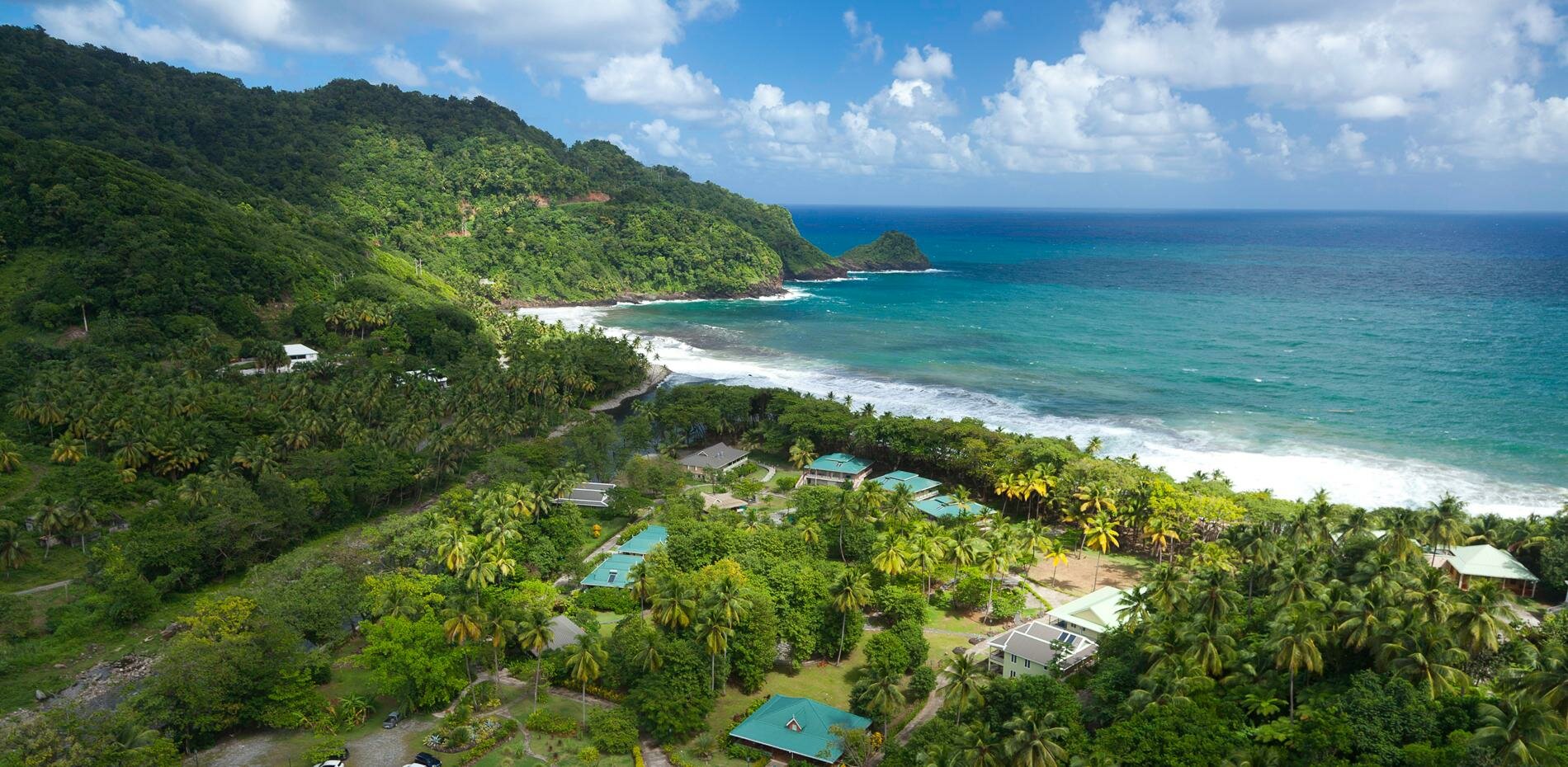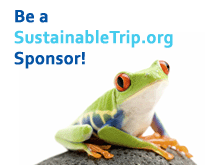
The island of Dominica (not to be confused with the Dominican Republic) is an ecotourist's Caribbean dream. And Rosalie Bay Resort -- the only Green Globe certified hotel on the island – was founded by an entrepreneur and nature lover who is determined to keep it that way. We spoke with the resort's founder and owner Beverly Deikel to learn more about Rosalie Bay's exuberant location and her efforts to conserve the environment, including endangered species like sea turtles.
Question: What kinds of wildlife can guests expect to see at your resort?
Deikel: Three species of endangered sea turtles nest on our protected black sand beach each year between March and October. Giant leatherback sea turtles, which can weigh upwards of 800 pounds, are spotted the most frequently, followed by green and hawksbill turtles.
There are also many types of birds, several types of lizards, crabs, iguanas, butterflies, and native plants found throughout the property. At night, music from the crickets and frogs, along with the sea breezes rustling the palm trees, will lull you to sleep.

Q: What are you doing to conserve your sea turtle nesting beaches?
Deikel: Our conservation efforts began more than 12 years ago, shortly after purchasing the property. We were excited to discover turtles nesting on our beach, but then found out that they were being illegally poached--at the time, a common practice on the island.
I wanted Rosalie Bay to be "turtle-friendly" and inspire Dominicans and visitors to conserve these species. My goal was to aid the recovery of sea turtles in Dominica and throughout the Caribbean. In 2003, I began a partnership with the Wider Caribbean Sea Turtle Conservation Network (WIDECAST) to develop a conservation program at Rosalie Bay. Originally called the Rosalie Sea Turtle Initiative (ROSTI), the program marked the first research and conservation initiative for endangered sea turtles on Dominica, and we worked closely with the national government. Program activities included collecting data on nesting sea turtles, educating adults and children in the community regarding the endangered status of the creatures, organizing programs to engage the community in beach clean-ups and sea turtle youth camps, establishing a national sea turtle hotline, and removing artificial lighting along the shores.
I am extremely proud that the conservation work that started at Rosalie Bay quickly spread into a nationwide effort.
When ROSTI began, there were only seven leatherback turtle nests at Rosalie Bay. In the past few years, there have been close to 70 nests each year!
Q: What an amazing accomplishment, congratulations! Can your guests get involved with sea turtle conservation as well?
Deikel: During turtle nesting season, guests can help patrol the beach to protect nesting turtles and aid researchers in collecting data or relocating nests that are too close to the ocean to the turtle hatchery. They can also be "on call" to help hatching baby sea turtles make their way out to sea.
Q: Where on the island is Rosalie Bay Resort located?
Deikel: We're perfectly situated on a 22-acre property bordered by two coastlines, where the Rosalie River meets the Caribbean Sea. We're located right at the edge of Morne Trois Pitons, a UNESCO World Heritage site with the richest biodiversity in the Lesser Antilles. Morne Trois Pitons National Park has everything: rainforests, volcanic landscapes, fumaroles (geysers), hot springs, and waterfalls. The park is also home to the famous Boiling Lake, a bubbling hot lake that's an adventurous eight-mile hike from the nearest road, and Emerald Pool, a picturesque waterfall and grotto.

Q: How does Rosalie Bay conserve energy and natural resources?
Deikel: Most of our electricity is renewably sourced. We have a 225-kW wind turbine--the first on Dominica and largest in the Leeward Islands of the Caribbean--as well as more than 200 solar panels.
Water, which is sourced from nearby natural springs, goes through a UV-filtration system before use and is heated with solar panels. An environmentally-friendly waste management system is used to ensure that nothing pollutes the nearby river.
In addition, our cottage accommodations were constructed to maximize energy efficiency by using stucco walls, cool tile or poured concrete flooring, soundproof and energy-efficient windows, and French doors that keep the buildings cool with minimal use of (or even without) air conditioning.
Q: What can your guests do to learn about local culture and customs?
Deikel: Our staff, which is 97% Dominican and primarily from the nearby village, enjoy conversing with guests and sharing their local culture and customs. In addition, we offer many scheduled tours to experience Dominica, called the "Nature Island" – including hiking some of the hundreds of miles of trails on the island, visiting the market in Roseau, soaking in a sulfur hot spring, meeting the local Kalinago people, and snorkeling at the famous Champagne Reef. Our front desk staff is happy to make recommendations and arrange private tours based on guests' interests, such as meeting with local artists.
Q: When Rosalie Bay Resort opened, how did you involve the local community?
Deikel: Rosalie Bay Resort was a ten-year labor of love for me and my partner Oscar. The land was undeveloped when we purchased it.
The local community was very much involved in the creation of the resort. When the local people heard that we would be building a resort and have jobs available, there was a line at our gates. Rosalie Bay provided, and continues to provide, a source of training and employment for local communities that were negatively impacted by the decline in the banana industry.
Oscar trained many local young men in construction trades because many had wanted to work, but didn't possess the skills they needed. Some of them also received training for new roles once the resort opened and still work with us to this day.

Q: Did you use local and sustainable materials when you built the hotel?
Deikel: All of the work was done by hand, meaning no heavy machinery was brought in. Locals hand carved the resort's hardwood furniture, created with wood found on Dominica. Most of the materials we sourced were local and renewable.
River stone found on the property was used for the walking paths, walls, and patio surrounding the pool. The furniture on the verandas is made from recycled milk jugs and the tiles used as flooring and on the walls in the bathrooms are made from recycled tiles.
In addition, the artwork displayed in our accommodations and facilities were created by local artists, whose work is also available for sale in the gift shop.
Q: How do you support the local community?
Deikel: In addition to employing local people, we support the local youth cricket team. We also celebrate Earth Day each year with a community project involving our staff, their families, and local youth and adults. This year, we organized a large tree planting event in conjunction with the government's One Million Hour Tree Planting project. During the holidays, we host a Christmas party for approximately 50 local underprivileged children and provide a fun afternoon with games, refreshments, gifts, and a visit from Santa Claus.
I have also been supporting several organizations since my early days visiting Dominica. Those include Church on the Way and Feed My Sheep, which work with children and the elderly on different sides of the country, the Grotto Home for the elderly and homeless, and Operation Youth Quake, which was formed after Hurricane David practically destroyed the island to provide food and counsel to homeless and troubled youth.

Q: Why are sustainable practices so important for your hotel?
Deikel: I believe that we have a responsibility to use natural resources in a way that protects the local environment and improves the well-being of local residents. Our mission at Rosalie Bay is to showcase the beauty of Dominica to visitors by developing a world-class nature resort, to protect the local environment, and to empower local residents by boosting their livelihoods.
Q: Of all of the hotels on Dominica, what makes Rosalie Bay Resort special?
Deikel: Our location. It is truly beautiful and surrounded by nature. It's what attracted me to purchase the property in the first place, and guests seem to love it as much as we do. Rosalie Bay is a place that you can relax, tune out the busy world, and tune in to nature – without having to sacrifice on conveniences.


